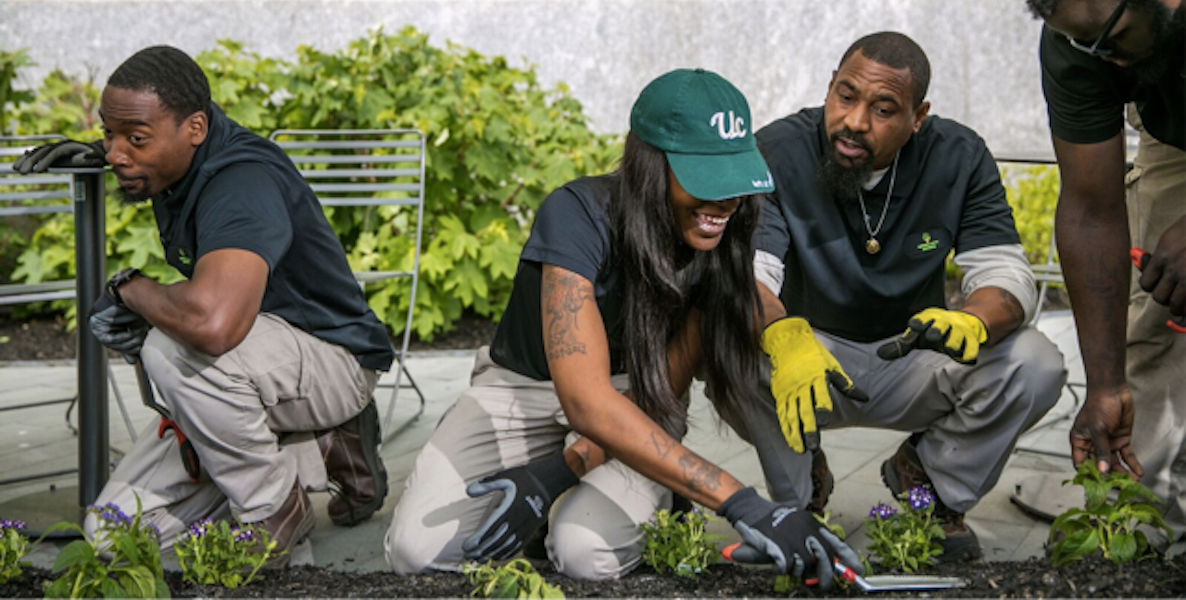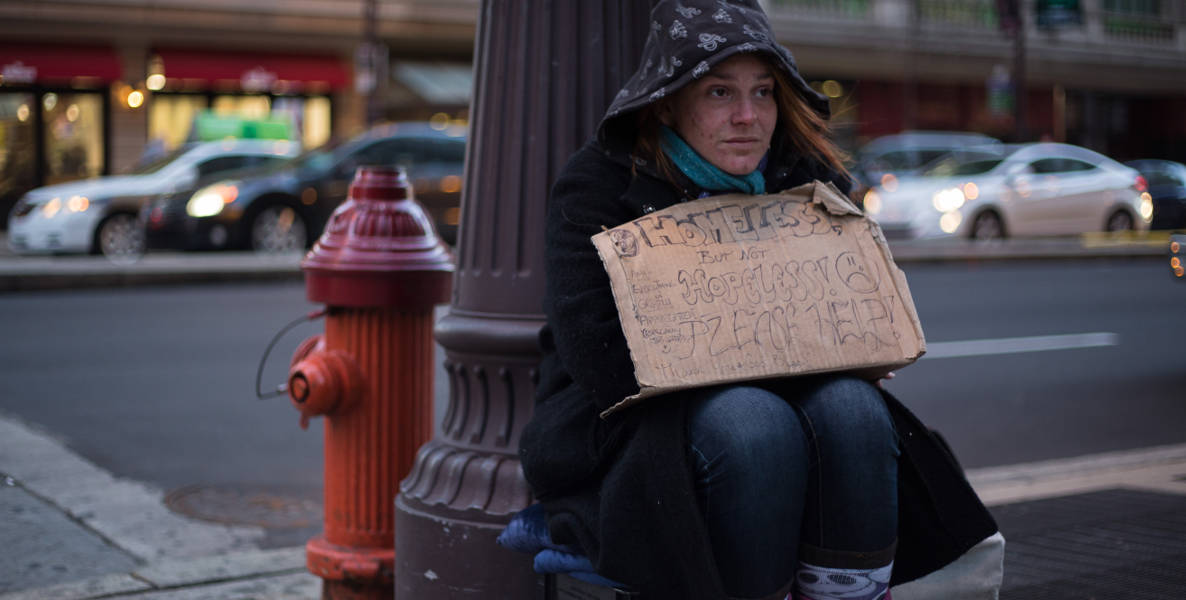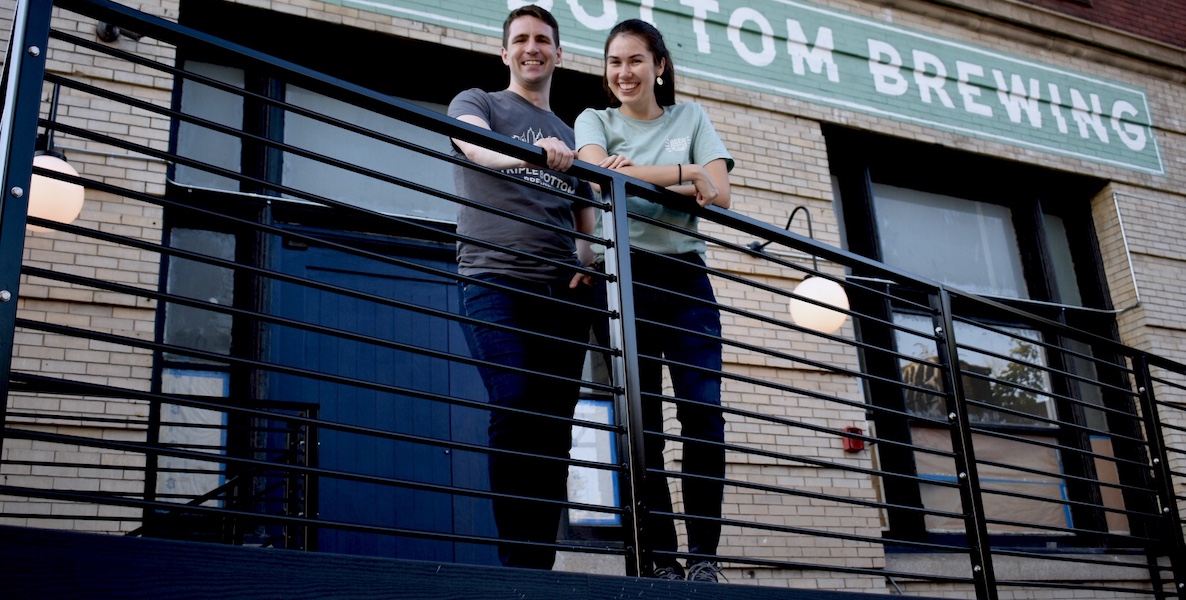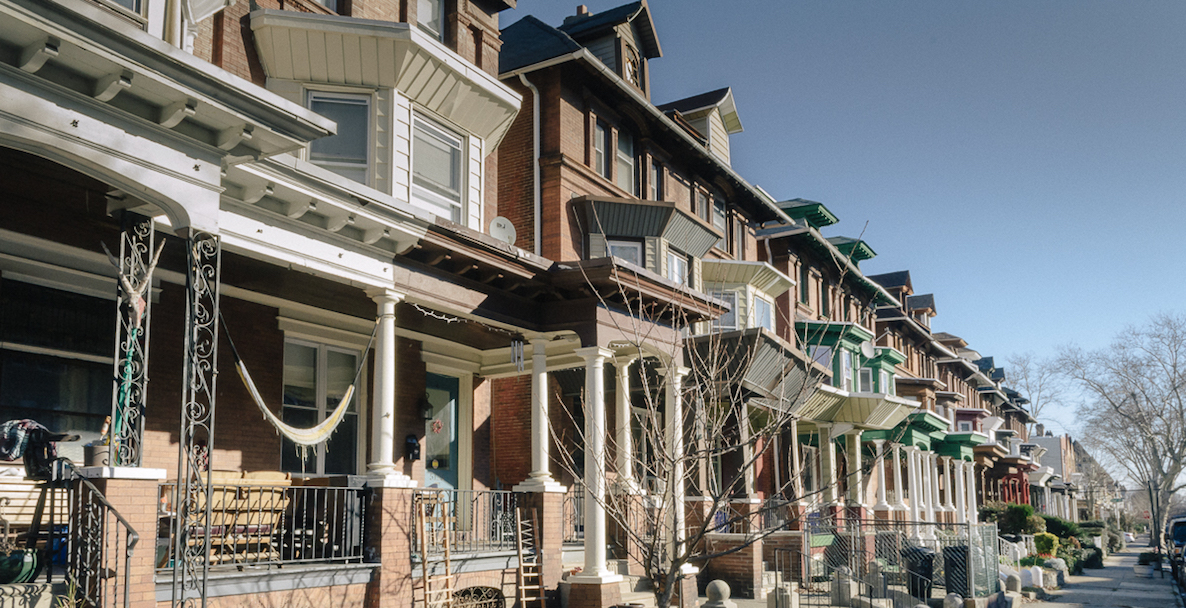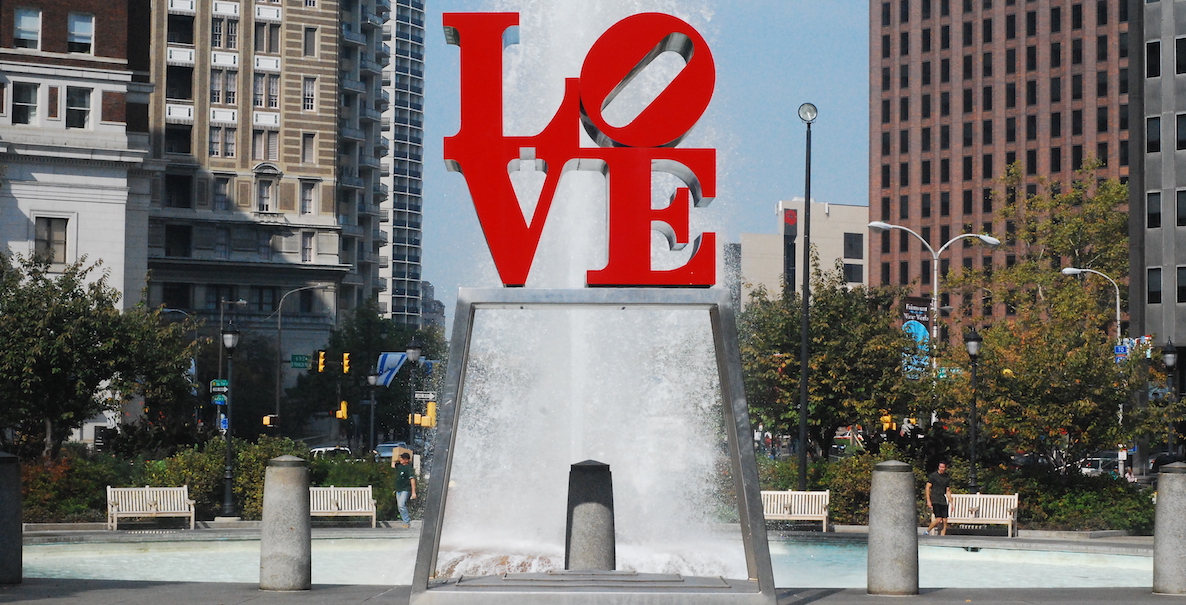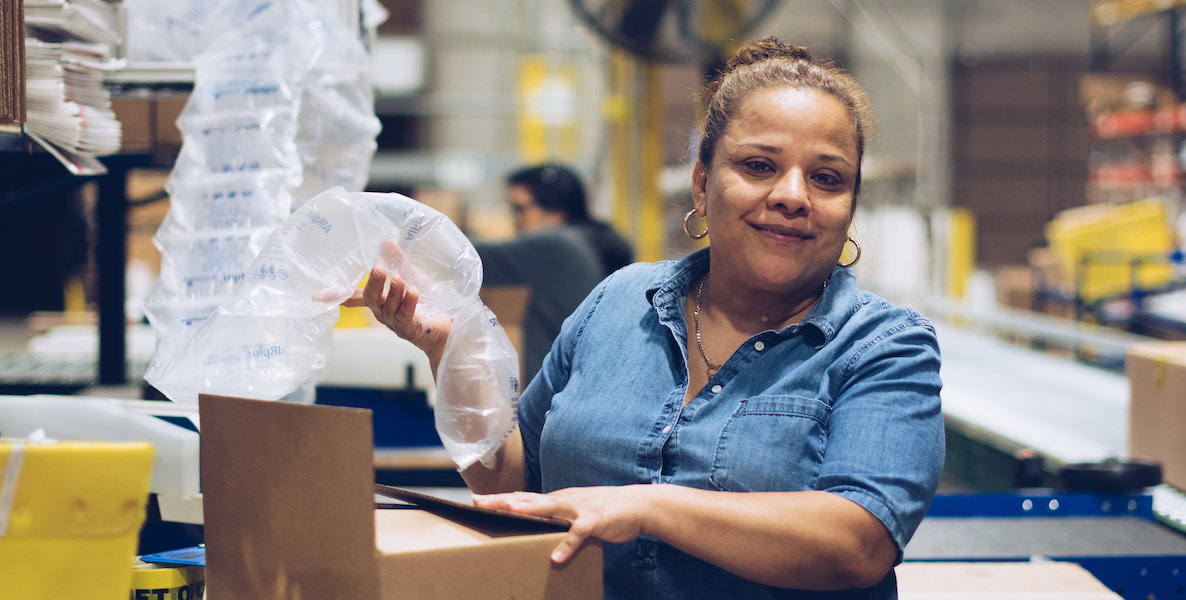Jason Zerbe attends a lot of events celebrating nonprofits and philanthropic organizations in the city, and he finds that, often, those organizations will showcase a “success story”—usually someone who was at one point downtrodden or lost and whom the organization swooped in to help regain their footing.
“They’ll parade the one person up on stage who they hired 30 years ago and they were homeless,” he says. “We have 15 to 20 of those people every single day.”
Zerbe is vice president and general manager of First Step Staffing Philadelphia, a non-profit staffing agency located in Kensington and originally founded in Atlanta.
The company helps vulnerable populations, such as recently homeless or incarcerated jobseekers, find open positions with First Step’s corporate customers, and offers them wraparound services, including job coaching and transportation, throughout their time employed.
The need they fill, explains Zerbe, is two-fold: First, the type of unskilled work that pays a decent hourly wage—often food processing or other warehouse jobs—is located outside of the city and thus aren’t easily accessible via public transit.
Second, such workplaces often don’t have the capacity to interview and hire on their own. “They’re in the business of selling fruit, not managing 300 people,” explains Zerbe.
First Step fills those gaps in staffing, with temporary employees often eventually converting to full-time employees of the company they’re working for through First Step.
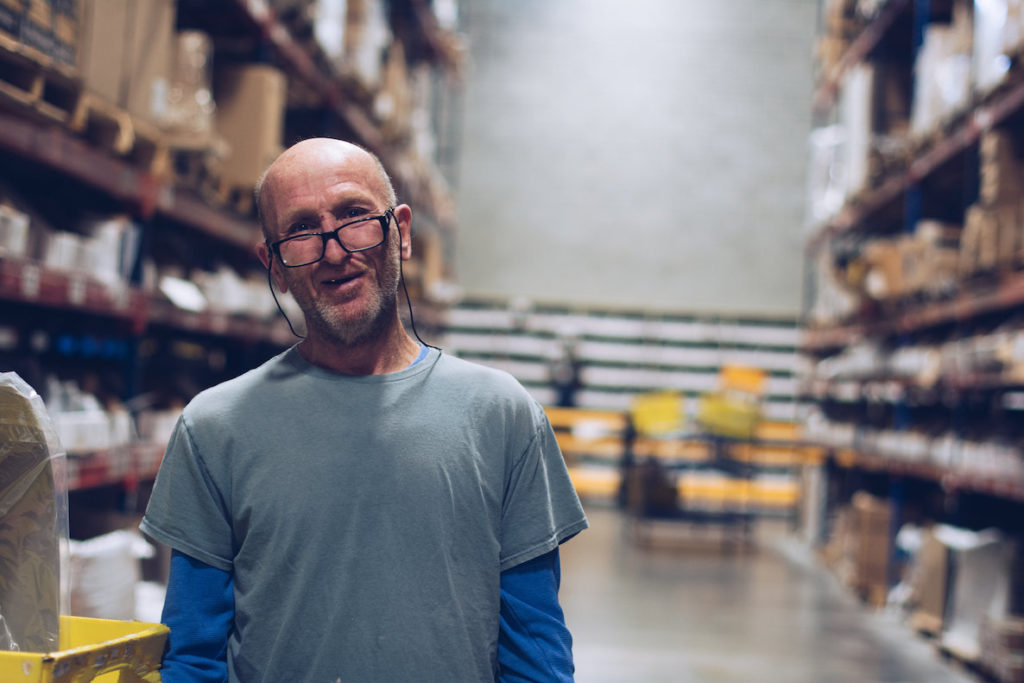
To solve the transportation problem, they do something simple—they give the employees a ride. Employees need only take a subway or bus to the Kensington office, and from there First Step transports them for a $4 fee in vans, buses and sometimes Ubers to their job locations.
This transportation is good not just for the employees, but for the employers. “It helps us to provide reliable employees to our customers,” explains Zerbe. “Before, they had 15 people coming 15 different ways who potentially had 15 different barriers to getting there. It might be toll money, my ride fell through, or something else.”
First Step also provides job coaches to the people it serves, who Zerbe says are “half staffing coordinator, half social worker.”
Because First Step recognizes that going from being in and out of work for several years to a full-time job might be a tough transition, the coaches support clients in finding a second or third job if the first one doesn’t work out. According to Dave Shaffer, the CEO of the company, “Every person has a story. We give many second and third and fourth chances here.”
Jasmine Twyman, a First Step job coach and recent Temple University graduate, says that her daily responsibilities range from recruiting applicants at job fairs to supporting jobseekers through the application process to helping them decide what type of work best suits them.
In its first year in Philadelphia, First Step employed 2,664 people, 58 percent of whom were recently homeless, formerly incarcerated, veterans, or a combination of these—and paid out $14.5 million in wages.
Particularly because of its work with homeless job seekers, she says First Step’s work shines light on a population easily overlooked by even those who see homeless individuals on Philadelphia’s streets everyday.
“People become desensitized to it, and walk by as if it’s not an issue. The population becomes invisible. But they need an opportunity just like other people,” she explains. “Organizations like us are important because we not only bring this to light but offer solutions in the form of stability.”
While Philadelphia has the highest poverty rate of the country’s 10 largest cities, it actually has the lowest number of people living without shelter—an estimated 1,083 in January 2018 compared to New York City’s 3,675 and Los Angeles’s staggering 22,887.
This is partially a result of local climate and size of population, but agencies like Project HOME in Philadelphia are also credited with conducting extensive outreach to find homeless individuals temporary shelter.
Additionally, the definition of homelessness varies, with the Department of Housing and Urban Development considering those who are staying with friends and several other categories homeless as well. Under this broader definition, around 5,700 people are homeless in Philadelphia.
In its first year in Philadelphia, First Step employed 2,664 people, 58 percent of whom were recently homeless, formerly incarcerated, veterans or a combination of these.
It employed 7,874 people nationwide in 2018—62 percent of whom fell into those populations—and paid out $34.1 million in wages, $14.5 million of which went to Philadelphia employees.
Sixty percent of the nationwide workers in 2018 either worked for First Step for more than six months or were converted to permanent employees with their employer.
Corporate customers in Philadelphia include 151 Foods, a food production facility in Bellmawr, New Jersey, and Country Fresh, a fruit and vegetable producer in Hatfield, as well as more local organizations and locations like the Phillies and Wells Fargo Arena, where employees do hospitality and janitorial work.
James Redd, a 29-year-old Camden resident, applied to jobs for two straight weeks after returning home from a five-year jail sentence in August, 2018—but heard back from no one. He had three children to support—ages 7, 9, and 10—had never been formally employed, and was starting to lose hope.
Then, he applied for a position at 151 Foods on Indeed, and was contacted by a First Step employee.
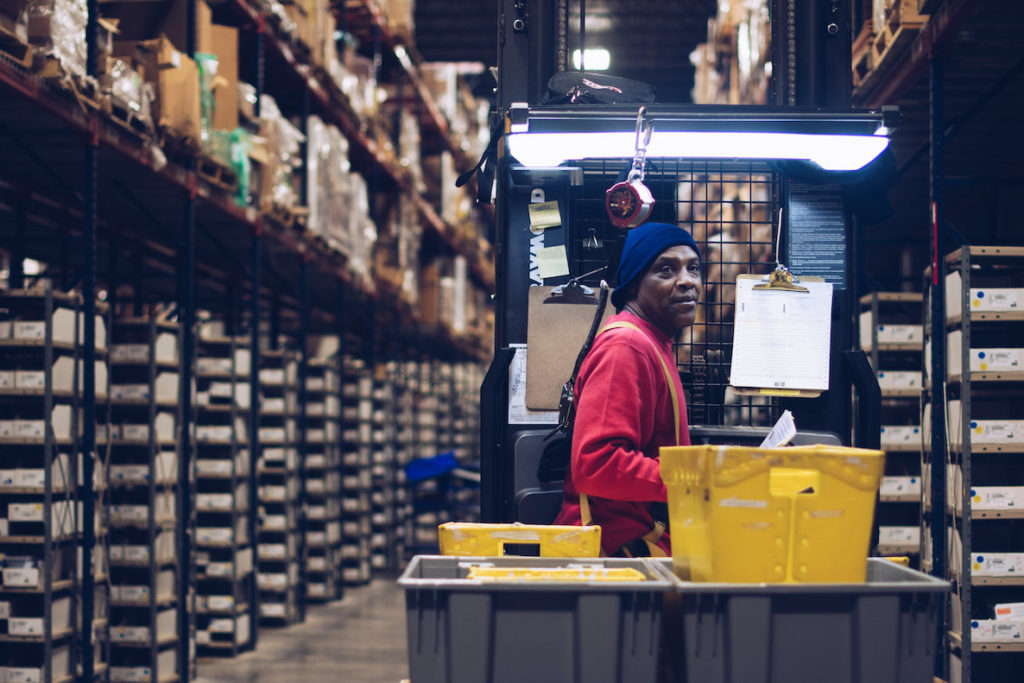
Redd spent 400 hours working for 151 as a temporary employee—receiving lots of Wawa gift cards from the company as a reward for his hard work—before being hired as a full-time employee. First Step’s support in finding this opportunity, he says, was “life changing,” and has allowed him to not only support his children but to stay on track with the terms of his parole.
Greg Block, who founded the organization in 2007, was at the time a successful businessman with a drive to support his community, something that had been instilled in him by his civil service-oriented family.
He had been owner and CEO of American Pacific Enterprises, a home furnishing manufacturer and importer, for 14 years, and was ready to put his successful leadership to work in the civil service sphere. He met with local Atlanta leaders to find out what the city’s biggest social service needs were and where his time and energy could do the most good.
“Homelessness was a big focus area at the time,” Block explains. “However, I saw one key critical component missing from the city’s strategies: jobs and income.” Block didn’t just want to house people, he wanted to give them the support and steady source of income they needed to house themselves.
“Every person has a story. We give many second and third and fourth chances here.”
Block landed on a staffing agency, rather than starting his own landscaping company or a moving business that would directly employ recently homeless individuals, because it seemed like a way to create more jobs for less money, thus allowing him to deepen his impact.
“He came to the conclusion that a staffing business that focused solely on the employment of these individuals required a lot less capital. It requires less hard assets to purchase,” explains Shaffer. “If you start a moving business and spend $100,000 on that truck, it only employs four or five people. The dollars you have to spend compared to how many jobs it creates, that’s really what you’re after as far as impact.”
Even with a staffing agency, Block found that he wasn’t able to employ as many people as he had wanted. Until 2014, he tried to grow the First Step organically in Atlanta, managing to employ 50 or 75 people everyday. But, Shaffer says, he wasn’t satisfied.
That’s when he came up with the idea of raising money to acquire a for-profit staffing agency in Atlanta, which already had relationships with employers. “Overnight, at the end of 2015, it went from a $2 million organization to an $18 million organization,” says Shaffer.
That low dollar-to-jobs-created ratio is what has made the model so scalable, and eventually allowed the team to bring it to Philadelphia.
When First Step acquires a new for-profit agency—in Philadelphia, a portion of On Time Staffing—they don’t let go any of the current staffers. “In essence, day one nothing changes,” explains Shaffer.
![]() Instead, leading up to the acquisition, First Step builds relationships with social services agencies in the area, who then refer potential employees to them. As people who formerly worked through the staffing agency leave, or as the number of jobs First Step hosts grows, they fill the open positions with the referrals.
Instead, leading up to the acquisition, First Step builds relationships with social services agencies in the area, who then refer potential employees to them. As people who formerly worked through the staffing agency leave, or as the number of jobs First Step hosts grows, they fill the open positions with the referrals.
A large portion of the team is eventually with formerly homeless or incarcerated workers or veterans. In the first half of 2019 in Philadelphia, this population made up 70 percent of all employed.
All of First Step’s clients are paid through the revenue the organization gets from its employer customers. Any charitable donations are used to scale the program to new cities or offer ancillary services like the transportation.
“If you give a $100,000 charitable donation, it doesn’t pay the employees,” explains Zerbe. “That’s why it’s scalable and growing.”
They purchase the for-profit companies through a mixture of charitable funding—in Philadelphia, from the Barra Foundation and the Samuel S. Fels Fund—city support, investors and loans from CDFIs, including the Reinvestment Fund.
“If you start a moving business and spend $100,000 on that truck, it only employs four or five people,” explains Shaffer. “The dollars you have to spend compared to how many jobs it creates, that’s really what you’re after as far as impact.”
The Philadelphia location’s revenue in 2018 was on par with its revenue when it was a for-profit, and is projected to be even higher in 2019. Shaffer says this is because, due to the support they offer their clients, they’re able to keep their customers happy.
For-profit staffing agencies generally fill about 80 percent of the jobs they’re asked to fill First Step’s fill rate is 98 percent. “It’s higher because we have people who want to work and we provide them with the assistance to get there,” explains Shaffer.
First Step’s success is proof, Zerbe says, that businesses can do both well and good at the same time—a growing trend among companies in America. “A lot of people don’t think you can, but First Step proves that that’s possible,” he says. “It can be done. We do it everyday.”
When choosing a city, leadership at First Step ask themselves four important questions:
- Does the city have a large homeless population, and does that population struggle to find employment?
- Does the city have a strong business environment, particularly among staffing agencies of light industrial companies—and would one of those companies be willing to sell?
- Does support for such a project from the government and other social service agencies exist? (Shaffer says some hesitance usually exists here, so they do their best to emphasize that they want to add to social services, not become competitors by duplicating them.)
- Is the money to make such an acquisition raisable in this city?
First Step is currently in the final stages of a potential acquisition and merger in California, with locations in both Los Angeles County and San Bernardino, and has had preliminary conversations in Chicago and Seattle.
Even as they grow, it’s clear that First Step will not lose sight of their priorities.
“First Step Staffing is all about the people. We’re all about the employees. We look at them as people that come first and the most important thing for us to do is to provide them sustainable, steady employment and rapid income,” he explains. “Where before, sometimes in the for-profit temp staffing world, temporary associates are looked at as a number. Ours are names and faces and stories and experiences. They are our number one priority.”
Photo courtesy Melissa Alexander




